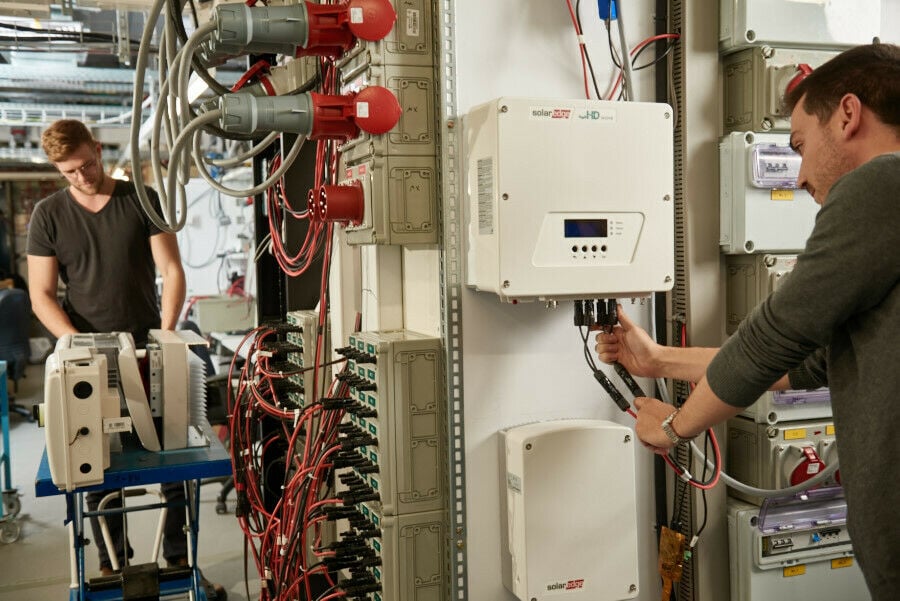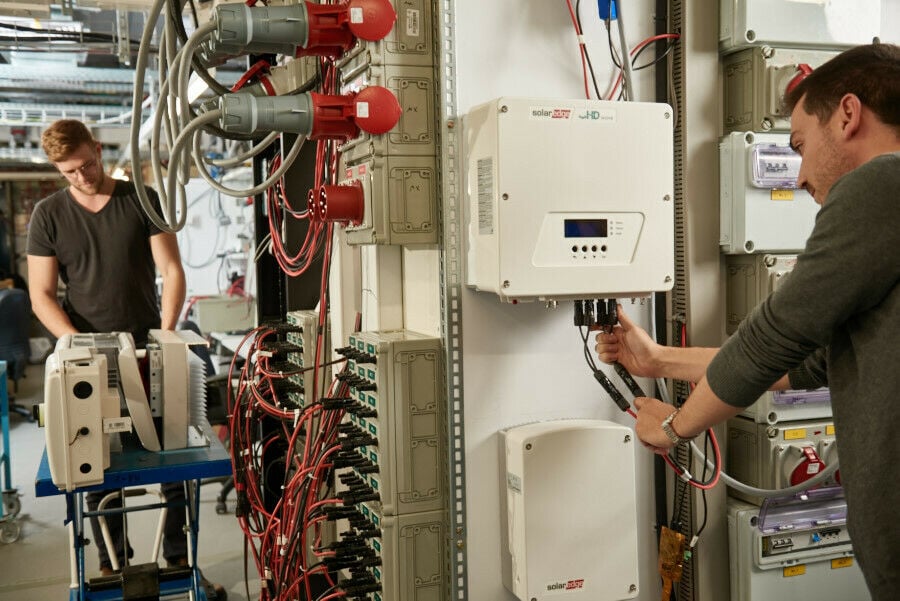In previous years, our conflict minerals practices have focused on the responsible sourcing of 3TG materials. Recently, with the significant expansion of our storage business, we have begun to expand our focus to responsible sourcing of Cobalt as well.
Adhering to the materiality principle, we started our Cobalt traceability risk analysis with the relevant material suppliers of our Storage Division (where most of the Cobalt SolarEdge purchases is used). We examined the EMRTs (extended minerals reporting templates) and the ESG reports and policies of suppliers related to most of the Cobalt procured upstream in our supply chain. These key suppliers have publicly committed to only purchasing products (including Cobalt) from RMAP (Responsible Minerals Assurance Process) conformant refiners. Their disclosed upstream refiners are all included in the RMI (Responsible Minerals Initiative) smelter/refiners lists as either: ‘Conformant’ (which has successfully completed an assessment against the applicable RMAP standard or an equivalent cross-recognized assessment) or ‘Active’ (has committed to undergoing an RMAP assessment, completed the relevant documents, and scheduled an on-site assessment). While we believe these satisfactory results cover the vast majority of Cobalt in our supply chain, we aim to continue to expand our relevant due diligence processes.
Responsible Cobalt Sourcing
Introduction – Responsible Procurement
SolarEdge Manufacturing Reach
contract manufacturing sites
owned and operated factories
Power Optimizers produced
4
4
>6,000
in Hungary, China, Vietnam and the U.S. for key SolarEdge products
in Israel, Italy and South Korea
*Includes own manufacturing and Tier 1 contract manufacturing
per manufacturing line each day


In 2021, we reached full manufacturing capacity in our manufacturing facility, “Sella 1”, located in northern Israel, from which we began commercial shipments to the U.S. of SolarEdge Power Optimizers and inverters in 2020. The proximity of Sella 1 to our R&D team and labs enables us to accelerate new product development cycles as well as define equipment and manufacturing processes of newly developed products which can then be adopted by our contract manufacturers worldwide. In mid-2022, we also commenced the first-stage operations of our new facility, Sella 2, a two gigawatt-hour (GWh) lithium-ion battery cell manufacturing plant in South Korea. The site significantly expanded its operations in 2023 (see section: Storage Solutions). We currently use contract manufacturing for the majority of our solar products. This production is carried out at four sites, operated by two leading global electronics manufacturing service providers, Jabil and Flex. Both of these contract manufacturers operate in accordance with sustainability principles and maintain sustainability programs in their own right, in addition to complying with SolarEdge’s requirements. Due to the key role of these contract manufacturers in SolarEdge’s supply chain, they have also been prioritized as part of our first batch of supplier on-site audits in connection with our Supplier Code of Conduct. Three of these four sites have undergone such audits during 2022-23, with our newest site in Austin (Texas) scheduled for such an audit in 2024 (see below).
According to SolarEdge’s requirements, all contract manufacturer sites must be certified with the latest editions of these standards: ISO 9001 (quality), ISO 14001 (environmental management) and ISO 45001/OHSAS 18801 (safety management). As of May 2024, all of SolarEdge current contract manufacturing sites have been confirmed as certified to these standards, representing over 80% of the combined direct monetary spend of our Solar and Storage divisions in 2023. In addition, the contract manufacturer sites must prove their compliance with RoHS, REACH, the conflict minerals requirements of the US Dodd-Frank Act, and additional regulations.
We have designed our manufacturing processes to produce high quality products at a competitive cost as part of a sustainable supply chain. We maintain a mix of in-house production and contract manufacturing.
SolarEdge aims to maintain the highest standards of ethical, responsible and transparent conduct throughout its operations. In parallel, the company strives to ensure that the same high standards are observed throughout SolarEdge’s entire supply chain. The company places great importance on the conduct of the suppliers with whom we engage for the manufacture, storage, supply, maintenance and delivery of our products and services.
In recent years, the global community has raised concerns relating to abuses of human rights in the Xinjiang Uyghur Autonomous Region (XUAR) in China. Some of these concerns have been connected to the sourcing of polysilicon, a key raw material in solar panel manufacturing.
As detailed in our Approach to Human Rights, SolarEdge does not tolerate any abuse of human rights, forced labor or modern slavery. SolarEdge does not manufacture solar panels and does not maintain any facilities (manufacturing or other) in XUAR. We purchase solar panels to be sold in some cases as Smart Modules (where our DC Power Optimizers are pre-integrated with the PV module). However, this constitutes a very small portion of our global business (PV modules amounted to less than 1% of all SolarEdge global sales in 2023). Nevertheless, we have reached out to our solar panel suppliers for their statements on this matter. The panel suppliers have declared that they do not have any involvement or direct connection with activities related to human rights violations in XUAR or elsewhere. We published a formal statement in this regard for our customers. See our published statement here.
Human Rights In China
Our Supplier Code of Conduct and Approach to Human Rights also include a focus on conflict minerals. The illegal extraction and trade of natural resources, as well as associated human rights violations, conflict and environmental degradation, are matters of growing international concern. These issues are especially acute in the eastern provinces of the Democratic Republic of Congo (DRC). Some of these concerns focus on the extraction and trade of ores of tantalum, tin, tungsten and gold (3TG), which flow to world markets through the DRC and adjoining countries. Once refined, these metals are commonly used within electronic products and additional industries.
SolarEdge does not procure metals directly from refiners or smelters. Nonetheless, we are taking action to increase transparency and ensure responsible procurement by our suppliers and sub-suppliers. SolarEdge's policy requires that our suppliers who manufacture components, parts, or products containing tin, tantalum, tungsten, and/or gold, must commit to sourcing those materials from responsible sources only and in compliance with SEC ruling and OECD guidance. We act to assure that no purchased good or materials within our supply chain would directly or indirectly contribute to conflict or any human rights violations. We expect our suppliers to define, implement and communicate to their own policy to their upstream suppliers. Our suppliers’ own policies should outline their commitment to the responsible sourcing of these materials, to define measures for implementation and for assuring legal compliance. We require suppliers to work with their entire supply chain to ensure traceability of these materials (at least) to the smelter level and report these details to us through CMRTs (Conflict Minerals Reporting Templates).
The engagement with our suppliers is conducted through a dedicated on-line tool developed by a responsible sourcing specialized vendor, where the target suppliers are asked to upload their CMRT templates. The details of sub-suppliers reported through the CMRTs are compared with lists of smelters with a possible risk of human rights violations. When a high-risk smelter is identified within our supply chain, the company investigates and, if needed, takes action to ensure we only source our materials from responsible sources. Suppliers providing submissions that include smelters of concern are instructed to undertake independent risk mitigation activities. Examples include a submission of a product level CMRT to better identify the connection to products that they supply to SolarEdge. Suppliers are given clear performance objectives and reasonable timeframes with the ultimate goal of eliminating smelters of concern from the supply chain. In addition, suppliers are guided to educational resources on mitigating risk identified through the CMRT collection process.
SolarEdge is part of an industry-wide outreach initiative targeting smelters and refiners who have not participated in an industry-recognized responsible minerals audit/assessment program. Through this initiative, which is operated by our responsible sourcing vendor, SolarEdge, along with over 100 downstream (by several tiers customers, and encourage them to participate a recognized program, in order to assure their responsible conduct.
For further details, see our full Policy on Conflict Minerals and our Annual Conflict Minerals Report on form SD[1].
Conflict-Free Sourcing
Our Approach to Supplier Management covers suppliers of goods and services to SolarEdge and includes our commitment to engage suppliers that meet SolarEdge’s requirements in legal, financial, environmental, social, human rights and governance matters, including all the provisions defined in our SCoC. This entails conducting relevant due diligence before engaging new suppliers and monitoring supplier adherence during the course of their engagement with SolarEdge. We support our commitment through procurement, staff training, supplier reviews and feedback, and risk assessment tools.
In 2023, we conducted on-site audits of two contract manufacturer sites, and one major raw material supplier, with regard to their SCoC compliance. Almost all of our contract manufacturer sites have undergone such audits during 2022-23, with our newest site in Austin (Texas) scheduled for this audit in 2024. At the same period (2022-23), a total of 3 major raw material suppliers have been similarly audited. The sites and suppliers selected have been prioritized due to their key role in SolarEdge’s supply chain operations.
These audits were led by SolarEdge’s global quality department and included a checklist of approximately 50 items that correlate to our SCoC requirements including, for example: Safety, Fair Employment, Environmental Management, Ethical Conduct, and protecting Human Rights. In cases where minor non-conformance issues were identified, the SolarEdge auditors have maintained contact with the sites to ensure the formalization of a corrective action plan and its execution. We aim to continue auditing key suppliers for ESG practices moving forward.
In 2023, and in line with an Israeli regulatory requirement to increase the enforcement of labor laws, we continued to conduct an annual salary audit of employment conditions in external labor service companies. The audited companies supply SolarEdge with cleaning and security services for the Company’s sites in Israel. The audits focused on fair employment conditions, checking compliance with the minimal payment terms required by law (including for overtime), and with the provision of mandated social benefits such as retirement saving programs, paid vacation days and sick leave, and additional terms. The 2023 audit results have not uncovered significant flaws in the audited companies practices. The findings of an earlier, similar audit in 2022 (together with our dissatisfaction with the quality of services rendered), led us to replace an audited company. We intend to continue conducting similar audits moving forward.
Supplier Management


Our Supplier Code of Conduct (SCoC) includes provisions regarding ESG topics such as Ethics, Safety, Environmental Protection, Human Rights, and Fair Employment. We have been engaging our direct suppliers since 2021, requesting that they sign their acknowledgement of the SCoC terms and commit to upholding them. In 2022, the direct suppliers of our Storage Solutions division were added to this engagement process, joining the existing direct suppliers of the Solar division.
More than 230 active suppliers have signed their acknowledgment of the SCoC terms (as of March 2024) or presented equivalent codes of conduct of their own. The products and services received from these suppliers are related to over 93% of the combined direct monetary spend of our Solar and Storage divisions in 2023.
We aim to continue to expand this engagement process moving forward.
Supplier Conduct
Join the SolarEdge Conversation
Contact our sustainability / ESG team
Contact us
How can we help you?
Responsible Cobalt Sourcing
Conflict-Free Sourcing
Human Rights in China
Supplier Management
Supplier Conduct
Sustainability Report 2023 /
Responsible Procurement
[1]
As of the publishing of this sustainability report, our most updated available conflict mineral report is for 2022. The 2023 conflict mineral report will be published later, by June 1, 2024.

Our Supplier Code of Conduct (SCoC) includes provisions regarding ESG topics such as Ethics, Safety, Environmental Protection, Human Rights, and Fair Employment. We have been engaging our direct suppliers since 2021, requesting that they sign their acknowledgement of the SCoC terms and commit to upholding them. In 2022, the direct suppliers of our Storage Solutions division were added to this engagement process, joining the existing direct suppliers of the Solar division.
More than 230 active suppliers have signed their acknowledgment of the SCoC terms (as of March 2024) or presented equivalent codes of conduct of their own. The products and services received from these suppliers are related to over 93% of the combined direct monetary spend of our Solar and Storage divisions in 2023.
We aim to continue to expand this engagement process moving forward.
Supplier Conduct
In recent years, the global community has raised concerns relating to abuses of human rights in the Xinjiang Uyghur Autonomous Region (XUAR) in China. Some of these concerns have been connected to the sourcing of polysilicon, a key raw material in solar panel manufacturing.
As detailed in our Approach to Human Rights, SolarEdge does not tolerate any abuse of human rights, forced labor or modern slavery. SolarEdge does not manufacture solar panels and does not maintain any facilities (manufacturing or other) in XUAR. We purchase solar panels to be sold in some cases as Smart Modules (where our DC Power Optimizers are pre-integrated with the PV module). However, this constitutes a very small portion of our global business (PV modules amounted to less than 1% of all SolarEdge global sales in 2023). Nevertheless, we have reached out to our solar panel suppliers for their statements on this matter. The panel suppliers have declared that they do not have any involvement or direct connection with activities related to human rights violations in XUAR or elsewhere. We published a formal statement in this regard for our customers. See our published statement here.
Human Rights In China
Our Approach to Supplier Management covers suppliers of goods and services to SolarEdge and includes our commitment to engage suppliers that meet SolarEdge’s requirements in legal, financial, environmental, social, human rights and governance matters, including all the provisions defined in our SCoC. This entails conducting relevant due diligence before engaging new suppliers and monitoring supplier adherence during the course of their engagement with SolarEdge. We support our commitment through procurement, staff training, supplier reviews and feedback, and risk assessment tools.
In 2023, we conducted on-site audits of two contract manufacturer sites, and one major raw material supplier, with regard to their SCoC compliance. Almost all of our contract manufacturer sites have undergone such audits during 2022-23, with our newest site in Austin (Texas) scheduled for this audit in 2024. At the same period (2022-23), a total of 3 major raw material suppliers have been similarly audited. The sites and suppliers selected have been prioritized due to their key role in SolarEdge’s supply chain operations.
These audits were led by SolarEdge’s global quality department and included a checklist of approximately 50 items that correlate to our SCoC requirements including, for example: Safety, Fair Employment, Environmental Management, Ethical Conduct, and protecting Human Rights. In cases where minor non-conformance issues were identified, the SolarEdge auditors have maintained contact with the sites to ensure the formalization of a corrective action plan and its execution. We aim to continue auditing key suppliers for ESG practices moving forward.
In 2023, and in line with an Israeli regulatory requirement to increase the enforcement of labor laws, we continued to conduct an annual salary audit of employment conditions in external labor service companies. The audited companies supply SolarEdge with cleaning and security services for the Company’s sites in Israel. The audits focused on fair employment conditions, checking compliance with the minimal payment terms required by law (including for overtime), and with the provision of mandated social benefits such as retirement saving programs, paid vacation days and sick leave, and additional terms. The 2023 audit results have not uncovered significant flaws in the audited companies practices. The findings of an earlier, similar audit in 2022 (together with our dissatisfaction with the quality of services rendered), led us to replace an audited company. We intend to continue conducting similar audits moving forward.
Supplier Management
Join the SolarEdge Conversation
Contact our sustainability / ESG team
Contact us
How can we help you?
In previous years, our conflict minerals practices have focused on the responsible sourcing of 3TG materials. Recently, with the significant expansion of our storage business, we have begun to expand our focus to responsible sourcing of Cobalt as well.
Adhering to the materiality principle, we started our Cobalt traceability risk analysis with the relevant material suppliers of our Storage Division (where most of the Cobalt SolarEdge purchases is used). We examined the EMRTs (extended minerals reporting templates) and the ESG reports and policies of suppliers related to most of the Cobalt procured upstream in our supply chain. These key suppliers have publicly committed to only purchasing products (including Cobalt) from RMAP (Responsible Minerals Assurance Process) conformant refiners. Their disclosed upstream refiners are all included in the RMI (Responsible Minerals Initiative) smelter/refiners lists as either: ‘Conformant’ (which has successfully completed an assessment against the applicable RMAP standard or an equivalent cross-recognized assessment) or ‘Active’ (has committed to undergoing an RMAP assessment, completed the relevant documents, and scheduled an on-site assessment). While we believe these satisfactory results cover the vast majority of Cobalt in our supply chain, we aim to continue to expand our relevant due diligence processes.
Responsible Cobalt Sourcing
Our Supplier Code of Conduct and Approach to Human Rights also include a focus on conflict minerals. The illegal extraction and trade of natural resources, as well as associated human rights violations, conflict and environmental degradation, are matters of growing international concern. These issues are especially acute in the eastern provinces of the Democratic Republic of Congo (DRC). Some of these concerns focus on the extraction and trade of ores of tantalum, tin, tungsten and gold (3TG), which flow to world markets through the DRC and adjoining countries. Once refined, these metals are commonly used within electronic products and additional industries.
SolarEdge does not procure metals directly from refiners or smelters. Nonetheless, we are taking action to increase transparency and ensure responsible procurement by our suppliers and sub-suppliers. SolarEdge's policy requires that our suppliers who manufacture components, parts, or products containing tin, tantalum, tungsten, and/or gold, must commit to sourcing those materials from responsible sources only and in compliance with SEC ruling and OECD guidance. We act to assure that no purchased good or materials within our supply chain would directly or indirectly contribute to conflict or any human rights violations. We expect our suppliers to define, implement and communicate to their own policy to their upstream suppliers. Our suppliers’ own policies should outline their commitment to the responsible sourcing of these materials, to define measures for implementation and for assuring legal compliance. We require suppliers to work with their entire supply chain to ensure traceability of these materials (at least) to the smelter level and report these details to us through CMRTs (Conflict Minerals Reporting Templates).
The engagement with our suppliers is conducted through a dedicated on-line tool developed by a responsible sourcing specialized vendor, where the target suppliers are asked to upload their CMRT templates. The details of sub-suppliers reported through the CMRTs are compared with lists of smelters with a possible risk of human rights violations. When a high-risk smelter is identified within our supply chain, the company investigates and, if needed, takes action to ensure we only source our materials from responsible sources. Suppliers providing submissions that include smelters of concern are instructed to undertake independent risk mitigation activities. Examples include a submission of a product level CMRT to better identify the connection to products that they supply to SolarEdge. Suppliers are given clear performance objectives and reasonable timeframes with the ultimate goal of eliminating smelters of concern from the supply chain. In addition, suppliers are guided to educational resources on mitigating risk identified through the CMRT collection process.
SolarEdge is part of an industry-wide outreach initiative targeting smelters and refiners who have not participated in an industry-recognized responsible minerals audit/assessment program. Through this initiative, which is operated by our responsible sourcing vendor, SolarEdge, along with over 100 downstream (by several tiers customers, and encourage them to participate a recognized program, in order to assure their responsible conduct.
For further details, see our full Policy on Conflict Minerals and our Annual Conflict Minerals Report on form SD[1].
Conflict-Free Sourcing
*Includes own manufacturing and Tier 1 contract manufacturing
SolarEdge Manufacturing Reach
contract manufacturing sites
owned and operated factories
Power Optimizers produced
4
4
>6,000
in Hungary, China, Vietnam and the U.S. for key SolarEdge products
in Israel, Italy and South Korea
per manufacturing line each day
In 2021, we reached full manufacturing capacity in our manufacturing facility, “Sella 1”, located in northern Israel, from which we began commercial shipments to the U.S. of SolarEdge Power Optimizers and inverters in 2020. The proximity of Sella 1 to our R&D team and labs enables us to accelerate new product development cycles as well as define equipment and manufacturing processes of newly developed products which can then be adopted by our contract manufacturers worldwide. In mid-2022, we also commenced the first-stage operations of our new facility, Sella 2, a two gigawatt-hour (GWh) lithium-ion battery cell manufacturing plant in South Korea. The site significantly expanded its operations in 2023 (see section: Storage Solutions). We currently use contract manufacturing for the majority of our solar products. This production is carried out at four sites, operated by two leading global electronics manufacturing service providers, Jabil and Flex. Both of these contract manufacturers operate in accordance with sustainability principles and maintain sustainability programs in their own right, in addition to complying with SolarEdge’s requirements. Due to the key role of these contract manufacturers in SolarEdge’s supply chain, they have also been prioritized as part of our first batch of supplier on-site audits in connection with our Supplier Code of Conduct. Three of these four sites have undergone such audits during 2022-23, with our newest site in Austin (Texas) scheduled for such an audit in 2024 (see below).
According to SolarEdge’s requirements, all contract manufacturer sites must be certified with the latest editions of these standards: ISO 9001 (quality), ISO 14001 (environmental management) and ISO 45001/OHSAS 18801 (safety management). As of May 2024, all of SolarEdge current contract manufacturing sites have been confirmed as certified to these standards, representing over 80% of the combined direct monetary spend of our Solar and Storage divisions in 2023. In addition, the contract manufacturer sites must prove their compliance with RoHS, REACH, the conflict minerals requirements of the US Dodd-Frank Act, and additional regulations.
We have designed our manufacturing processes to produce high quality products at a competitive cost as part of a sustainable supply chain. We maintain a mix of in-house production and contract manufacturing.
Introduction – Responsible Procurement
SolarEdge aims to maintain the highest standards of ethical, responsible and transparent conduct throughout its operations. In parallel, the company strives to ensure that the same high standards are observed throughout SolarEdge’s entire supply chain. The company places great importance on the conduct of the suppliers with whom we engage for the manufacture, storage, supply, maintenance and delivery of our products and services.











